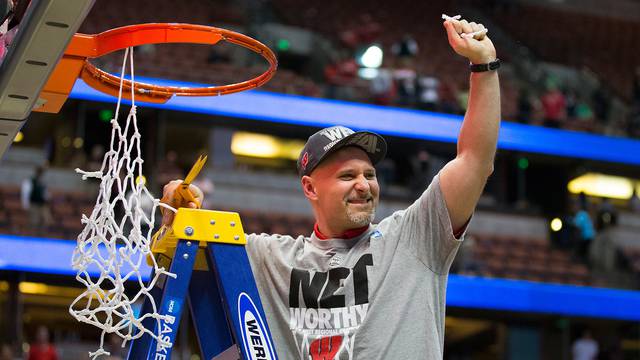Badgers Forced to Again Move On From More Off-the-Court Drama
MADISON, Wis. – The search for a normalcy for the University of Wisconsin will have to wait.
Hoping to move on from the off-the-court drama that enveloped the program late last month, the Badgers now must figure out how to move on without strength and conditioning coach Erik Helland.
Helland resigned Thursday after school officials concluded an investigation regarding his use of a racial epithet in front of players more than a month ago.
“It’s emotional,” Wisconsin head coach Greg Gard said Friday. “He’s been an integral part of our program for seven years and had a big impact on a lot of student-athletes who have come through here. At the same time, like he said in his statement, he made a mistake and he’s own that from the very first time he told me.”

That conversation, according to Gard, came Saturday night in the hours following Wisconsin’s victory over Michigan State.
UW said in a statement distributed Thursday that it received the information last weekend that Helland, “while recounting a story from earlier in his NBA career, had used a racial epithet in the presence of multiple Wisconsin men’s basketball student-athletes. UW Athletics confirmed that assertion on Sunday.”
According to a report in the Wisconsin State Journal, Helland made that comment during a shootaround while the Badgers were preparing for their victory at Ohio State at the beginning of January. He apologized to the student-athletes and considered the matter behind him.
According to a report in the Milwaukee Journal Sentinel, after Kobe King made public his decision to leave the program, Helland heard rumblings that the incident might be used by King to be granted a waiver to gain immediate eligibility next season.
Gard found out Monday that Helland was being put on administrative leave and informed the players Tuesday morning before leaving for Minneapolis.
In its statement Thursday, UW said it “works to promote a safe and welcoming environment for its student-athletes and staff and the aforementioned language used does not align with the values of the athletic department, men’s basketball program or the university.”
Helland joined Wisconsin in 2013 after a long tenure with the NBA’s Chicago Bulls and was a key selling point to multiple high school recruits. Brad Davison – who said Helland’s presence was one of the big reasons he committed to Wisconsin – said he and his teammates still don’t have all the answers.
“He’s someone I looked forward to coming and seeing every day,” Davison said. “He pushed me to become a better player in the weight room, on the court and become a better person, too. It’s someone I always hold dear to my heart. It was really hard to hear the news. It’s sad that he’s not going to be around the team anymore.”
Gard said the administration has an interim plan to help Wisconsin in the strength and conditioning department and that it's already partially in place. He didn’t elaborate further.
The resignation of Helland adds another chapter to the list of off-the-court issues the Badgers have been forced to deal since the spring. It started with the emotional turmoil of assistant coach Howard Moore’s accident that killed his wife and daughter, continued with the repeated denied appeals of Micah Potter that kept him sidelined for the first semester, King’s departure and the one game suspension of Davison last week.
Bluntly, just like those past problems, Wisconsin’s players know they have no choice but to press on with a tough opponent in the Buckeyes coming to the Kohl Center Sunday.
“Whenever you go through trials and forms of adversity, you could go two ways, you can divide and separate or come closer together because you are forced to rely on each other in these times,” Davison said. “That’s our goal each and every day. We’re communicating a lot and trying to have those conversations just to make sure we can become closer and closer together and block out the outside noise that’s going on.
“Because when it comes down to it, we still have a job at hand.”